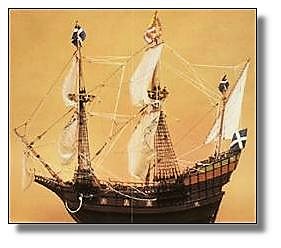Tags
France, French Canadian, French Revolution, Institut canadien, La Capricieuse, Le Vieux Soldat canadien, Octave Crémazie, Province of Canada
I would like to tell you about French-Canadian poet Octave Crémazie (1827-1879). Crémazie wrote « Le Vieux Soldat canadien, » a poem featuring an old Canadien soldier watching the harbour and asking his son whether or not the French can be seen. France returned, but the arrival of « La Capricieuse », in 1855, did not signal a rebirth of New France.
La Capricieuse
As unbelievable as it may seem, it had been ninety-two years since France had visited its former colony. From 1763 to 1855, no French ship had come from France to what was, in 1855, the Province of Canada.
The ship, a Corvette, arrived at Quebec city on the 14 July 1855, Bastille Day, a day which meant very little to French-speaking Canadians. In fact, as devout Catholics, many of them looked upon the French Revolution (1789-c. 1794) as the moment when the French clergy had been imperiled to such an extent that many priests had to flee their native land.
French-speaking Canadians who witnessed the arrival of « La Capricieuse » were overwhelmed. They may have known that, under the terms of the Treaty of Paris (1763), France had chosen Guadeloupe over New France. But it may have been comforting for the former citizens of New France to think that they had simply lost a battle, the Battle of the Plains of Abraham.
The Battle of the Plains of Abraham
The Battle of the Plains of Abraham was a fifteen-minute battle fought on 13 September 1759. Yet, the short battle claimed the life of its two commanding officers: 32 year-old Major-General James P. Wolfe and 47 year-old Louis-Joseph de Montcalm. French-speaking Canadians look upon that defeat as the catastrophe that caused New France to become a British colony. The defeat is a major factor in this narrative, but it doesn’t tell the full story. It is better for French-speaking Canadians to think they were defeated, than ceded to England. Under the terms of the Treaty of Paris (1763), France chose to cede New France in order to keep Guadeloupe.
The Literary Movement of Quebec: Octave Crémazie
Octave Crémazie, baptized Claude-Joseph-Olivier,[i] (1827-1879) was the leading member of a literary school created in the wake of Lord Durham’s remark to the effect that French-speaking Canadians did not have a history and lacked a literature. That remark had been offensive to French-speaking Canadians and the decision to assimilate them was also unacceptable. They had been living in on North-American soil since the 1600s, tilling their thirty acres of land.
François-Xavier Garneau (1827-1879)
When he was appointed Prime Minister in 1842, (1827-1879) addressed the assembly in French and French-speaking Canadians set about to prove Lord Durham wrong. François-Xavier Garneau (1809-1866) wrote a three-volume Histoire du Canada, published between 1845 and 1848. Moreover, a literary movement was created in Quebec city, called Le Mouvement littéraire de Québec (the Literary Movement of Quebec or the Patriotic School of Quebec.)
Octave Crémazie was the leader of that particular school and was one of the founders of l’Institut Canadien. Although he declared bankruptcy and had to seek refuge in France, in 1862, never to return to Canada, these circumstances did not tarnish his reputation as a poet. He is considered the father of French-Canadian poetry. During his years of exile in France, he kept in touch with members of group. He and Henri-Raymond Casgrain wrote to one another. But he had become Jules Fontaine and died in poverty.
The Encyclopædia Britannica on Crémazie
In The Encyclopædia Britannica, the “national bard,” is described as “[a]n extraordinarily learned man, educated at the Seminary of Quebec [who] started a bookshop in 1844 that became the centre of an influential literary circle later referred to as the Patriotic School of Quebec (or the Literary Movement of Quebec).” Writers and historians met in “la boutique à Crémazie,” Crémazie’s shop.
Britannica also tells us that “[i]n 1861 Crémazie and his friends began issuing a monthly magazine of literature and history, Les Soirées Canadiennes, to preserve the folklore of French Canada” and that among Crémazie’s most “famous patriotic poems are ‘Le Vieux Soldat canadien ’(1855; ‘The Old Canadian Soldier’), celebrating the first French naval ship to visit Quebec in almost a century, and ‘Le Drapeau de Carillon’ (1858; ‘The Flag of Carillon’).”[ii] At Carillon, New France won the battle.
Le Vieux Soldat canadien
However, the poem we are looking at is “Le Vieux Soldat canadien.” The old soldier is certain France will return and keeps asking his son whether or not the ships can be seen on the horizon. Each eight-line decasyllabic (10 syllables) stanza ends with a haunting: Dis-moi mon fils ne paraissent-ils pas? (Tell me, my son, are they not within sight?). As he was dying, (« mais en mourant ») the old soldier was still telling his crying son ( « il redisait encore » ) that he, the son, would see the dawn (« l’aurore ») of that great day, when they would return (« Ils reviendront ! »), but that he [the father] would no longer be alive (the full text is online).
Mais en mourant, il redisait encore À son enfant qui pleurait dans ses bras: « De ce grand jour tes yeux verront l’aurore, « Ils reviendront ! et je n’y serai pas ! » (But as he was dying, he kept saying To his child who was crying in his arms: “Of that great day your eyes will see the dawn They will come back! but I will not be there!”)The people of Quebec city were delighted to see “La Capricieuse.” The French had sent a gift of books for the Institut Canadien, its Montreal branch, I should think. But the French were in Canada to conduct business.
La Patrie Littéraire or The Literary Homeland
Crémazie’s poem is an example of literary homeland (patrie littéraire) literature as is Philippe-Joseph Aubert de Gaspé Anciens Canadiens.[iii] (For the Wikipedia, entry click on Philippe-Joseph Aubert de Gaspé.) French-speaking Canadians had lost their Lower Canada and built a “literary homeland.” They created the history and literature which, Lord Durham had reported, they did not have. Writing became their salvation.
Sailing Ships in Art

The Fleet off Shore (art.com)
25 April 2012
WordPress _________________________
[i] Odette Condemine, “Octave Crémazie.” The Canadian Encyclopedia, http://www.thecanadianencyclopedia.com/articles/octave-cremazie
[ii] “Octave Crémazie.” Encyclopædia Britannica. Encyclopædia Britannica Online. Encyclopædia Britannica Inc., 2012. Web. 25 Apr. 2012. <http://www.britannica.com/EBchecked/topic/142505/Octave-Cremazie>.
[iii] Dale Miquelon, “La Capricieuse,” The Canadian Encyclopedia, http://www.thecanadianencyclopedia.com/articles/la-capricieuse
The entry “La Capricieuse” reads as follows:
“Commander Paul-Henry de Belvèze proceeded by steamer and train to Montréal, Toronto and Ottawa before leaving Québec for France on August 25. His mission was to report on the prospects of trade with Canada, made possible by Britain’s proclamation of free trade and by the Anglo-French alliance of 1854. The result was the opening of a French consulate at Québec in 1859, followed by mutual, short-lived tariff concessions and the development of a modest trade. However, the visit is remembered chiefly as the official endorsement of the Franco-Canadian cultural rapprochement that had been gathering impetus since the 1830s.”
Links to related blogs
“The Aftermath (cont’d) Aubert de Gaspé’s Anciens Canadiens” https://michelinewalker.com/2012/03/30/the-aftermath-contd-aubert-de-gaspes-anciens-canadiens/
“The Aftermath & Krieghoff’s Quintessential Quebec” https://michelinewalker.com/2012/03/29/the-aftermath-krieghoffs-quintessential-quebec/
“The Battle of Fort William-Henry and Cooper’s Last of the Mohicans http://michelinewalker.com/2012/03/26/the-battle-of-fort-william-henry-coopers-last-of-the-mohicans/
“Louis-Joseph de Montcalm Gozon, Marquis de Saint-Veran” https://michelinewalker.com/2012/03/25/louis-joseph-de-montcalm-gozon-marquis-de-saint-veran/
“Nouvelle-France’s Last and Lost Battle: The Battle of the Plains of Abraham” https://michelinewalker.com/2012/03/24/nouvelle-frances-last-and-lost-battle-the-battle-of-the-plains-of-abraham/
—ooo—







